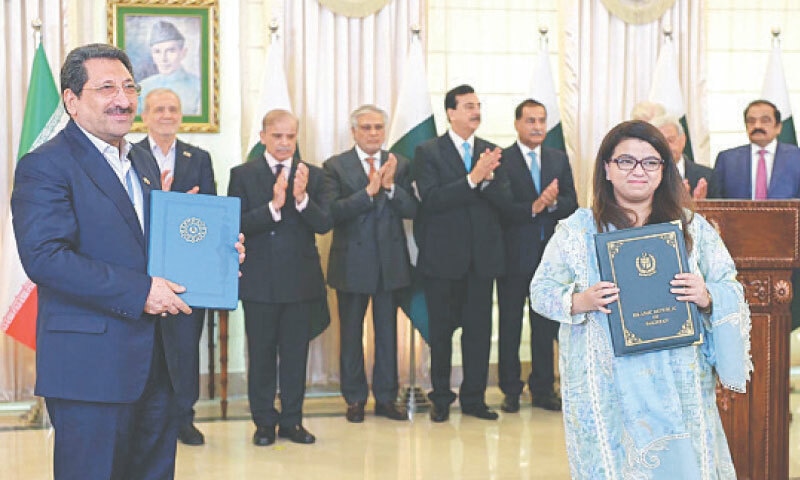• Dozen MoUs, deals signed as both sides vow to take bilateral trade to $10bn
• Dar welcomes ‘positive momentum’ towards free trade agreement
• Iranian president meets Zardari, army chief before wrapping up his two-day visit
ISLAMABAD: Pakistan and Iran on Sunday agreed that peace and prosperity in their border regions hinged on effectively combating terrorism, as both countries renewed their commitment to increase annual bilateral trade to $10 billion.
The consensus was reached during a bilateral meeting at the Prime Minister’s House in Islamabad and later emphasised at a joint press conference by Prime Minister Shehbaz Sharif and Iranian President Masoud Pezeshkian. “The development of economic and trade ties will be achieved through peace, stability, and tranquillity,” Mr Pezeshkian said, underscoring that terrorism remains a key obstacle to mutual prosperity.
“Given the threats from terrorist groups in border areas, both sides emphasised the need to increase cooperation to ensure border security and safeguard the peace and well-being of citizens in border cities,” the Iranian president added.
The nearly 900-kilometre border between the two countries has long faced security threats from proscribed groups, such as Jaish al-Adl and the Balochistan Liberation Army. Persistent issues, including terrorism, smuggling, and mutual accusations of harbouring militants, have periodically strained ties.
PM Shehbaz acknowledged that security was paramount for progress in bilateral relations. “There will be zero tolerance for all forms of terrorism. If anyone falls victim to terrorism in Iran, it is the same as someone being affected by terrorism in Pakistan,” he said.
“For peace and development in our region, and along our hundreds of kilometres-long shared border, we must cooperate against terrorism and take effective steps to eliminate the scourge of terrorism once and for all,” the PM added.
While the two leaders voiced their commitment to deepening cooperation, specific operational details were reportedly discussed in President Pezeshkian’s meeting with Chief of Army Staff Field Marshal Asim Munir. Neither side issued a statement on the meeting by the time of publication.
Later in the evening, Mr Pezeshkian met senior Pakistani military leaders, including Chairman Joint Chiefs of Staff Gen Sahir Shamshad Mirza, Air Chief Marshal Zaheer Babar Sidhu, and ISI chief Lt Gen Asim Malik at the presidency before the dinner reception hosted by President Asif Ali Zardari. A naval representative was also in attendance.

$10 billion trade target
The two sides reaffirmed their commitment to raising annual bilateral trade to $10 billion — a target first set during the late Iranian president Ebrahim Raisi’s visit to Pakistan in April 2024.
“We can easily, in a short time, increase the volume of trade from the current $3 billion to the projected goal of $10 billion,” Mr Pezeshkian said during the joint media conference.
PM Shehbaz echoed the sentiment. “We also jointly hope that the $10bn trade target is achieved at the earliest,” he said.
Official estimates place current bilateral trade at approximately $2.8bn.
Trade has been constrained by a range of factors, including international sanctions on Iran, security concerns along the border, inadequate infrastructure, and limited economic complementarity.
Diplomatic and political fluctuations, often shaped by broader geopolitical tensions, have also affected the implementation of trade agreements.
While neither leader offered a clear roadmap to resolve these issues, both underscored a shared political will to continue engaging on them.
“Our delegations will take these discussions forward very soon,” the PM said.
Earlier, at the bilateral talks, he had emphasised the need to convene the long-delayed 22nd meeting of the Pakistan-Iran Joint Economic Commission at the earliest. The 21st meeting of the Commission was held in 2022.
Proposals discussed during the talks included facilitating barter trade, increasing export quotas for rice, fruits, and meat, operationalising cross-border markets, and removing trade barriers.
Border market development remains a key focus. Although the two countries agreed several years ago to establish six such markets, only three have become operational so far.
“The development of transit routes – railway routes and sea routes – the expansion and equipping of border markets, the facilitation of trade, and the establishment of joint free economic zones are critical needs in the relationship between the two countries, and we had constructive discussions on these issues,” Mr Pezeshkian said.
Among the documents exchanged after Sunday’s talks was a “joint ministerial statement on the intent to finalise (the) Free Trade Agreement.”
On the sidelines of the visit, a business forum was also held.
Speaking at the event, Deputy Prime Minister and Foreign Minister Ishaq Dar welcomed the “positive momentum” toward finalising the FTA, calling it a potential catalyst for strengthening bilateral trade.
12 agreements and MoUs
Pakistan and Iran signed and exchanged 12 agreements and memorandums of understanding (MoUs) to enhance cooperation across a broad spectrum of areas. The documents covered trade, transit, science and technology, tourism, agriculture, cultural exchange, maritime safety, and judicial cooperation.
The agreements include collaboration on plant quarantine, joint use of the Mirjaveh-Taftan border crossing, ICT, tourism cooperation for 2025-27, and a joint ministerial statement on finalising a Free Trade Agreement.
“We reached agreements in political, economic, commercial, and cultural fields, and signed documents to facilitate and promote cooperation in commerce, culture, tourism, transportation, and scientific and educational exchanges,” Mr Pezeshkian said.
He left for Iran after the reception at the Presidency.
Published in Dawn, August 4th, 2025

